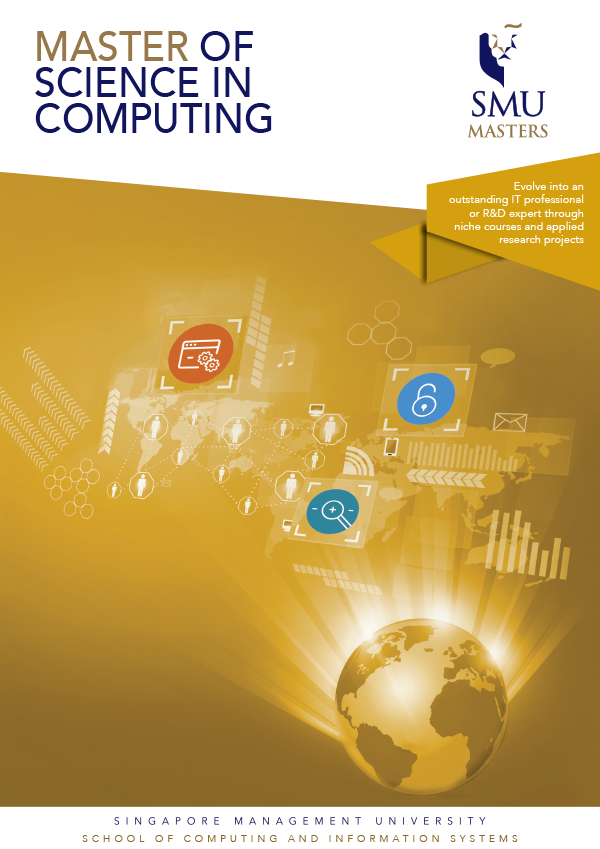Master of Science in Computing programme is designed to enhance your knowledge and skills by providing you with a broad view of information systems, in addition to valuable hands-on experiences. If you are interested in developing new technologies and creating innovative applications, Master of Science in Computing will be ideal for you. Infocomm industry has been a key contributor to economic development and the driving force behind the fast growing knowledge-based economy in Singapore. Infocomm technologies are the foundation for many applications in industry, government and other institutions. Singapore needs to have an infocomm-savvy workforce and globally competitive infocomm manpower to sustain national economic competitiveness.
This programme is distinctive in its emphasis on industrial strength projects as an essential component of the curriculum. You will not only acquire knowledge in the classroom but also be expected to confidently and innovatively apply what you have learned.
While working with our partner centres/institutes, you will be challenged with real problems faced by today's industries, gaining highly sought-after application development and research experiences. The programme will provide students with hands-on research/application experience through strong collaboration with aligned institutes, centres and labs.
The programme is designed for full-time study (1 year). Part-time admission (2 years) will only be considered for exceptionally strong applicants who cannot enrol full-time.
MSC Programme Brochure

Programme Tracks & Details - Technology Tracks Overview
We encourage individuals interested in technology related R&D to apply for a Technology Track in our Master of Science in Computing programme.
The programme currently offers 3 technology tracks:

Data Science & Engineering
Students will master and develop scalable and secure solutions to store and retrieve large datasets of diverse types (e.g. spatial, multimedia, text, etc.), as well as analytics methods for mining and understanding collections of evolving data and social networks.

Cybersecurity
Students will gain in-depth knowledge of relevant security issues in computer systems, networks and their applications.
Thus, students are prepared for a career in a variety of scenarios from large corporations to the development of their own entrepreneurial information security capability.

Software & Cyber-Physical Systems
Students will be trained with good theoretical knowledge and excellent practical skills in designing and implementing complex software systems.
This track is ideal for those students who want to upgrade and expand their knowledge and pursue a career in the software industry.
Programme Structure
Students are required to complete 10 Course Units (CUs) comprising of Core Courses, Elective Courses and a Capstone Project.
The curriculum composition is as follows:
| Programme Track | Core Courses | Elective Courses | Capstone Project | Total Course Units |
|---|---|---|---|---|
Technology Tracks
| 6 CUs (With minimum 2 CUs from Core Courses) | 4 CUs | 10 CUs | |
Curriculum Modal Schedule
The following is the modal schedule of the 3 tracks that we are offering.
Timing for classes are as follows:
- CS or IS2XX/3XX/4XX series are scheduled during daytime on weekdays for 3 hours between 8:00am to 6:45pm
- CS or IS6XX series are scheduled either on weekday evenings from 7:00pm to 10:15pm or Saturdays (8:15am to 11:30am; 12:00pm to 3:15pm)
- CS or IS7XX series are scheduled on weekday evenings from 7:00pm to 10:15pm
Actual scheduling of the classes will only be determined nearer to beginning of teaching term.
Data Science & Engineering (DSE) Track
| Term | Core Courses | Electives |
|---|---|---|
| 1 | CS701: Deep Learning and Vision CS707: Generative Models for NLP and Multimodal Reasoning CS711: Learning and Planning in Intelligent Systems IS713: Foundations for Data Analytics | CS201: Data Structures and Algorithms CS420: Introduction to Artificial Intelligence CS421: Principles of Machine Learning CS422: Reasoning, Planning and Learning under Uncertainty CS425: Natural Language Communication CS612: AI System Evaluation IS424: Data Mining and Business Analytics IS428: Visual Analytics for Business Intelligence IS434: Social Analytics & Applications IS446: Managing Customer Relations with Analytics – Asian Insights IS459: Big Data Architecture CS715: Systems Security (Offered in alternate Academic Year) |
| 2 | CS703: Optimization and Computing CS705: Algorithms and Optimization (Offered in alternate Academic Year) CS712: Machine Learning | CS202: Design and Analysis of Algorithms CS420: Introduction to Artificial Intelligence CS421: Principles of Machine Learning CS424: Image Perception CS426: Agent-based Modelling and Simulation IS415: Geospatial Analytics and Applications IS424: Data Mining and Business Analytics IS428: Visual Analytics for Business Intelligence IS450: Text Mining and Language Processing CS702: Computational Interaction CS704: Information Security CS706: Software Mining and Analysis (Offered in alternate Academic Year) CS708: Mobile and Distributed Systems (Offered in alternate Academic Year) |
Cybersecurity (CYBSEC) Track
| Term | Core Courses | Electives |
|---|---|---|
| 1 | CS715: Systems Security (Offered in alternate Academic Year) CS443: Software and Systems Security | CS440: Foundations of Cybersecurity CS445: Cyber Threat Intelligence CS462: Internet of Things: Technology and Applications CS612: AI System Evaluation CS701: Deep Learning and Vision CS707: Generative Models for NLP and Multimodal Reasoning CS711: Learning and Planning in Intelligent Systems IS713: Foundations for Data Analytics |
| 2 | CS704: Information Security CS441: Network Security CS442: Data Security and Privacy | CS440: Foundations of Cybersecurity CS444: Strategic Cybersecurity Management CS461: Mobile and Pervasive Computing & Applications CS462: Internet of Things: Technology and Applications CS702: Computational Interaction CS703: Optimization and Computing CS705: Algorithms and Optimization (Offered in alternate Academic Year) CS708: Mobile and Distributed Systems (Offered in alternate Academic Year) CS712: Machine Learning |
Software & Cyber-Physical Systems (SCPS) Track
| Term | Core Courses | Electives |
|---|---|---|
| 1 | CS711: Learning and Planning in Intelligent Systems CS715: Systems Security (Offered in alternate Academic Year) CS708: Mobile and Distributed Systems (Offered in alternate Academic Year) | CS204: Interconnection of Cyber-Physical Systems CS301: IT Solutions Architecture CS440: Foundations of Cybersecurity CS443: Software and Systems Security CS460: Foundations of Cyber-Physical Systems CS462: Internet of Things: Technology and Applications CS612: AI System Evaluation IS211: Interaction Design and Prototyping IS442: Object Oriented Programming IS458: Cloud Management and Engineering IS459: Big Data Architecture CS701: Deep Learning and Vision CS707: Generative Models for NLP and Multimodal Reasoning IS713: Foundations for Data Analytics SMT481: Smart-City Operations Research |
| 2 | CS702: Computational Interaction CS706: Software Mining and Analysis (Offered in alternate Academic Year) | CS205: Operating System Concepts with Android CS301: IT Solutions Architecture CS440: Foundations of Cybersecurity CS441: Network Security CS461: Mobile and Pervasive Computing & Applications CS462: Internet of Things: Technology and Applications IS442: Object Oriented Programming IS447: Smart Healthcare in Asia CS703: Optimization and Computing CS705: Algorithms and Optimization (Offered in alternate Academic Year) CS704: Information Security CS712: Machine Learning |
Note: Students are not recommended to take both CS421 and CS712. Some courses may not be offered every Academic Year.